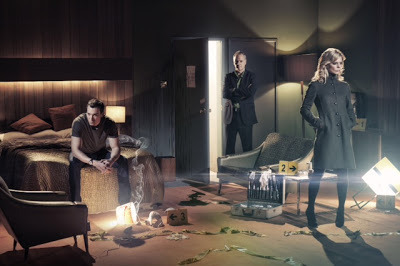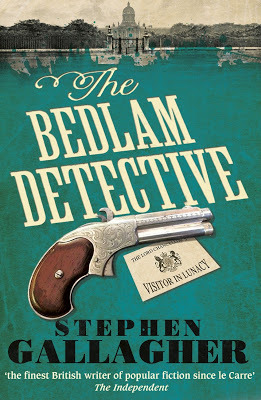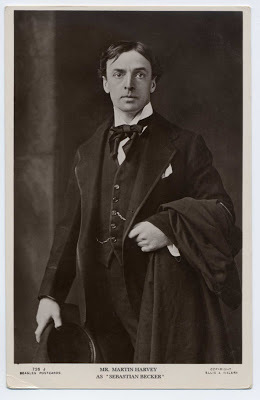Stephen Gallagher's Blog, page 27
January 16, 2013
Jack Irish
A couple of interesting TV movies came out of Australia last year, with Guy Pearce playing the title role of Jack Irish in Black Tide and Bad Debts, based on novels by Peter Temple.

Not exactly the same tone as Jesse Stone, but for me they seemed to scratch the same itch. They're making a couple more. Worth looking out for.

Not exactly the same tone as Jesse Stone, but for me they seemed to scratch the same itch. They're making a couple more. Worth looking out for.
Published on January 16, 2013 05:19
January 13, 2013
Top 10 Crime Shows
"I’ve never made it all the way through an Inspector Morse. Everyone who loves The Wire is lying. A Touch of Frost is part of a plot to destroy humanity’s will to live. Jonathan Creek went steadily downhill after Caroline Quentin left. The writers on The Mentalist are all fat and ride a golf cart to lunch.”
At the request of the Dead Good Books blog, I compiled a list of ten TV crime shows that I think have exceptional merit.
You can read about those that get the thumbs-up here.
Here's a hint:

At the request of the Dead Good Books blog, I compiled a list of ten TV crime shows that I think have exceptional merit.
You can read about those that get the thumbs-up here.
Here's a hint:

Published on January 13, 2013 03:11
January 7, 2013
The Random Page
When The Kingdom of Bones first came out in hardcover, I was invited to blog about it for The Page 69 Test. This was the result...
As a teenager I had a fascination with old-time Penny Dreadfuls and turn-of-the-century thrill fiction. Tom Sayers was a leading character in one of those old story papers, The Marvel. Loosely – very loosely – based on an actual historical figure, the fictional Sayers was your classic Victorian hero. Clean-living, morally upright, and with a hero's enviable physical prowess.
These were the unsung narratives of the Age of the Great Storytellers. They gripped the masses, but they weren't made to travel. Haven't you ever bought the DVD set of a TV show you used to love, and realised with a twinge of sadness that what you're experiencing isn't pure joy, but rather that joy remembered?
It takes more than just the old material to recreate a form. My ambition with The Kingdom of Bones was to take the characters, settings and narrative pacing of those old stories, and to bring them to new life with the kind of themes and complex psychology that we look for in modern fiction.
Page 69 of the novel finds Police Superintendent Turner-Smith, "a formidable figure with a broad white moustache, a war wound and a walking-stick", in the back room of a public house. He's here to meet a man whom he believes to be Tom Sayers. The year is 1888 and the setting is the North West of England. Sayers is a former prize-fighter who's given up the ring, and now serves as the business manager to a small touring theatrical troupe.
Unbeknownst to Turner-Smith, the man across the table is an impostor. The real Tom Sayers is in the theatre next door, watching his company perform. What's about to take place will deprive Sayers of his good name and his liberty, with consequences that will pretty much destroy any future he might have hoped for with the woman he loves.
As a teenager I had a fascination with old-time Penny Dreadfuls and turn-of-the-century thrill fiction. Tom Sayers was a leading character in one of those old story papers, The Marvel. Loosely – very loosely – based on an actual historical figure, the fictional Sayers was your classic Victorian hero. Clean-living, morally upright, and with a hero's enviable physical prowess.
These were the unsung narratives of the Age of the Great Storytellers. They gripped the masses, but they weren't made to travel. Haven't you ever bought the DVD set of a TV show you used to love, and realised with a twinge of sadness that what you're experiencing isn't pure joy, but rather that joy remembered?
It takes more than just the old material to recreate a form. My ambition with The Kingdom of Bones was to take the characters, settings and narrative pacing of those old stories, and to bring them to new life with the kind of themes and complex psychology that we look for in modern fiction.
Page 69 of the novel finds Police Superintendent Turner-Smith, "a formidable figure with a broad white moustache, a war wound and a walking-stick", in the back room of a public house. He's here to meet a man whom he believes to be Tom Sayers. The year is 1888 and the setting is the North West of England. Sayers is a former prize-fighter who's given up the ring, and now serves as the business manager to a small touring theatrical troupe.
Unbeknownst to Turner-Smith, the man across the table is an impostor. The real Tom Sayers is in the theatre next door, watching his company perform. What's about to take place will deprive Sayers of his good name and his liberty, with consequences that will pretty much destroy any future he might have hoped for with the woman he loves.
Turner-Smith considered the man before him for a moment, and then decided that he could speak as one gentleman to another. They were more likely to have interests in common than in conflict.Even though the story's main character is offstage in this scene, I should imagine that the page makes for a reasonable taster of the novel as a whole. I've always reckoned that the best way to test out a book is to pick a random paragraph or two; at the very least, they'll give you a sense of whether you connect with the author's voice. In this case I'd hope that page 69's combination of history, greasepaint and villainy will give any prospective reader a fair idea of what lies ahead.
“Take a look at this, please, Sayers,” he said, and placed before him one of the pasted-up sheets that suggested a link between paupers that had been mutilated without apparent motive, and the stage company’s progress around the country.
The other man read for a while, and then glanced up.
“Some of our less notable receptions.”
“The dates, Mister Sayers. Look at the dates.”
He read on for a while. Then he sat back in the attitude of a man conceding an argument that had already been won. “This is very revealing,” he said.
And Turner-Smith, who for the past minute had been given the opportunity for a closer study of his visitor, said, “Are you by any chance wearing greasepaint, Mister Sayers?”
The man threw the paper onto the table between them.
“Ah,” he said. “There you have me.”
Under the table, Turner-Smith reached out for his sword stick. He took care not to signal his intention. “Yet you are not listed on the playbills among the actors,” he said.
“Very true.” The man smiled. “I can see that you are too good a detective for me, superintendent.”
A few moments later, the man rose from the booth and walked out of the saloon. The four commercial travellers in the next booth were laughing so hard at a story that none of them noticed his departure. One took a draught from his mug and leaned back in his seat, only to splutter it out all over the table.
His fellows were slow to catch on. Their humour ebbed, where his had vanished in a flash.
“What the devil?” he said. “Something pronged me!”
And he turned in his seat to find out what it was.
Published on January 07, 2013 08:16
January 6, 2013
Silent Witness Season 16
I'll have some more information on upcoming stuff, including UK and US publication dates for The Bedlam Detective paperback editions, in a few days' time.
For now here's the BBC's publicity still for Season 16 of Silent Witness, for which I've written a two-hour story. The season begins this Thursday and if the shot puts you in mind of a 10cc wraparound vinyl album cover, that makes two of us.
(Just me? Really? OK...)

Pic shows Emilia Fox, William Gaminara, and new regular cast member David Caves.
My two-parter is called The Legacy and I've just been told that it's scheduled to run over the nights of Thursday, January 31st and Friday, February 1st.
The lineup for this story also includes the legendary Richard (The Haunting) Johnson.
For now here's the BBC's publicity still for Season 16 of Silent Witness, for which I've written a two-hour story. The season begins this Thursday and if the shot puts you in mind of a 10cc wraparound vinyl album cover, that makes two of us.
(Just me? Really? OK...)

Pic shows Emilia Fox, William Gaminara, and new regular cast member David Caves.
My two-parter is called The Legacy and I've just been told that it's scheduled to run over the nights of Thursday, January 31st and Friday, February 1st.
The lineup for this story also includes the legendary Richard (The Haunting) Johnson.
Published on January 06, 2013 05:55
December 31, 2012
New Years' Two-Day Promotion
Published on December 31, 2012 08:58
December 28, 2012
Litro
Just before the holidays I did a Q&A for Litro, the London-based print and online literary magazine.
If you could have a superpower, what would it be? Why?You can find more gems to rock the world, including What's the most extreme thing you've done in pursuit of reading or writing? and Describe your most defining experience with money, if you click here.
The ability to delete selected unpleasant memories. Which would be a whole can of worms because we're the products of all our experiences, good and bad. Lots of story potential there.
Published on December 28, 2012 05:33
December 24, 2012
Bedlam Detective UK cover
Published on December 24, 2012 06:23
December 23, 2012
Is it just me or...
Is there an FX house that specialises in totally unconvincing CG cityscapes for period movies? Because they seem to be getting a lot of work this year.
Published on December 23, 2012 03:54
December 18, 2012
New Sebastian Becker Story
As part of the runup to Christmas, I've written a new short story for Random House's Dead Good Books site. Set in the Bethlem Royal Hospital in 1912, the action takes place in the period between The Kingdom of Bones and The Bedlam Detective. It'll serve as a brief introduction to Becker and his world.
It was late in the afternoon when one of the ward orderlies appeared in the doorway to Sebastian Becker’s basement office. Sebastian had spent most of the day clearing a space to work. They’d given him a desk and a chair, and a hook for his coat. He would have appreciated a window.
The orderly, clearly not expecting to find the room occupied, said, ‘Oh.’
‘Is that my welcome letter?’ Sebastian said, eyeing the envelope in the orderly’s hand.
‘That would depend, sir,’ the orderly said. ‘Are you the Visitor’s man?’The story continues here.
Published on December 18, 2012 03:55
December 16, 2012
On Being a Pro
As an early-career writer you work about 90% from the heart and about 10% from the head. Stuff pours out of you. You can lose track of time while you're working. Everything's inspiration and there's little in the way of calculation. I've heard writers claiming that they go into a trance-like state when they work and, frankly, they're right up their own arses; all they're trying to do is impose some mystic significance on that undisciplined rush.
To be carried along by that kind of inspiration is an exhilarating experience but, inevitably, there's a downside. The heart is not a great organiser. The evidence is there in all those would-be debut novelists who can't muster the craft to place a single short story with an indie magazine, but keep on sending out their 250,000 word epic.
Being a pro means being in control of your gift. The same's true whether we're talking about writing, art, dance, sports... anything. An outpouring of the heart can be high-value stuff but, like a kid in a kitchen, it needs a hell of a lot of cleanup to get anything presentable from it.
And when you're starting out, that's exactly what you do. You pour it all down onto the page, and then you look at it. You think it's wonderful. Others don't seem to get it. What will it take to make them see it the way you want them to? What do you have to change? What do you need to lose? What do you have to supply that isn't there already? Do it again. Do it different. Do it better. Make it work.
The balance starts to shift as you instinctively seek that magically right proportion of feeling and thinking. You learn to recognise what's right before you set it down, as opposed to having to work out what's wrong afterwards. If the balance shifts too far, if you become all calculation and no inspiration, then you fall into the habits of a hack. But mostly the process seems to take care of itself over time, as long as you keep at it.
I've lifted these thoughts from the afterword to the Telos Classics edition of Valley of Lights, in which I ramble muchly about the background to the writing of the novel and the circumstances surrounding its publication.
I may put more of it online in time, if I can work out how avoid dumping one big TLDR on you.
To be carried along by that kind of inspiration is an exhilarating experience but, inevitably, there's a downside. The heart is not a great organiser. The evidence is there in all those would-be debut novelists who can't muster the craft to place a single short story with an indie magazine, but keep on sending out their 250,000 word epic.
Being a pro means being in control of your gift. The same's true whether we're talking about writing, art, dance, sports... anything. An outpouring of the heart can be high-value stuff but, like a kid in a kitchen, it needs a hell of a lot of cleanup to get anything presentable from it.
And when you're starting out, that's exactly what you do. You pour it all down onto the page, and then you look at it. You think it's wonderful. Others don't seem to get it. What will it take to make them see it the way you want them to? What do you have to change? What do you need to lose? What do you have to supply that isn't there already? Do it again. Do it different. Do it better. Make it work.
The balance starts to shift as you instinctively seek that magically right proportion of feeling and thinking. You learn to recognise what's right before you set it down, as opposed to having to work out what's wrong afterwards. If the balance shifts too far, if you become all calculation and no inspiration, then you fall into the habits of a hack. But mostly the process seems to take care of itself over time, as long as you keep at it.
I've lifted these thoughts from the afterword to the Telos Classics edition of Valley of Lights, in which I ramble muchly about the background to the writing of the novel and the circumstances surrounding its publication.
I may put more of it online in time, if I can work out how avoid dumping one big TLDR on you.
Published on December 16, 2012 02:40





